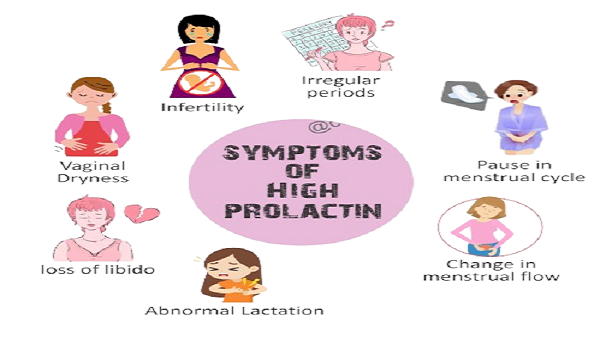
Contents
Periodic stress is a universal experience that may potentially have detrimental effects on both mental and physical well-being. A fascinating characteristic of the effect is its association with the levels of prolactin in the body. Prolactin is often associated with lactation, however it also plays a crucial role in several other physiological processes, beyond only breastfeeding. The intricate connection between stress and prolactin levels demonstrates the fragile interdependence of our emotional and physical well-being. This article examines the effects of stress on prolactin levels and the overall functioning of the body.
An In-Depth Examination of the Functions and Regulation of Prolactin
Prolactin is a vital hormone for all organisms, but especially crucial for women who are nursing their infants. This word goes beyond just a mere display of knowledge to impress your friends. Prolactin, a hormone, not only regulates metabolism and the immune system but also facilitates increased milk production in nursing moms.
Cabergoline Treat high concentration of the hormone prolactin in the blood is known as hyperprolactinemia. During breastfeeding, the pituitary gland releases the hormone prolactin, which primarily boosts milk production. Among the many health issues that may arise from an abnormal rise in prolactin levels are menstrual cycle abnormalities, infertility, and erectile dysfunction. Cabergoline eliminates these issues by regulating prolactin levels.
An Examination of the Stress Response Mechanism
Imagine this situation: you’re feeling anxious since your cherished plant was inadvertently knocked over by your cat. Adrenaline and cortisol, which are stress hormones, are secreted when the body’s stress response systems are triggered. It may come as a surprise to learn that stress may also impact the levels of prolactin.
The Impact of Stress on Prolactin Secretion
Exposure to elevated amounts of stress might potentially upset the delicate balance of prolactin secretion in your body. Elevated levels of stress may induce fluctuations in prolactin levels, which in turn can interfere with the hormone’s normal physiological processes.
Outcome for health and physiological measurements
Hyperprolactinemia may lead to infertility, irregular menstrual periods, and galactorrhea in non-lactating individuals. Your body seems to be creating an excessive amount of milkshakes, even without your explicit desire.
The impact of variations in prolactin levels on cognitive functions
Increased levels of prolactin have been linked to symptoms such as anxiety, melancholy, and tiredness. Prolactin may have an effect on mood and brain function. It seems that your head is experiencing hormonal imbalances.
Long-term Effects of Chronic Stress
A persistently stressful situation might be likened to a persistent intruder that invades your home and refuses to go, causing continuous aggravation and disruption. Chronic stress may have a detrimental effect on an individual’s health, perhaps leading to alterations in prolactin levels.
Discrepancy in Prolactin Levels and Chronic Stress
Mood disturbances and variability Prolonged periods of stress might potentially disturb the normal amounts of prolactin in your body, perhaps affecting your ability to conceive. It seems that there is a disparity in your prolactin levels, and your stress indicator is displaying a red signal.
Ensuring sufficient sleep, taking vacations, and allowing your prolactin levels to increase should be your primary concerns. Be certain, your body will be appreciative.
Effective techniques for managing stress to ensure optimal prolactin levels
Stress may result in a range of health problems, such as alterations in our prolactin levels. Be assured, nonetheless. Nevertheless, it is feasible to maintain steady prolactin levels by mitigating stress.
Cabergoline 0.5mg is used to treat a variety of illnesses that arise from excessive production of the hormone prolactin. It may be used to treat pituitary prolactinomas, which are tumors of the pituitary gland, as well as certain menstruation issues and issues with fertility in both sexes.
Implementing lifestyle modifications to reduce stress
Engage in physical activity: Exercising is an excellent method for alleviating stress. Participating in a yoga class or hosting a home dance party might help ease symptoms of anxiety and improve circulation.
Engaging in daily meditation or mindfulness exercises, even for a little duration, may assist you in focusing on your breath and the present moment. Consequently, this practice has the potential to decrease your stress levels.
Enjoy a peaceful and rejuvenating sleep. It is essential to ensure that you have a sufficient quantity of sleep. Ensure that your body receives the necessary respite to cope with stress by striving for a duration of seven to nine hours of sleep every night.
Adopt a diet that contains a variety of nutrients in appropriate proportions to fulfill your body’s nutritional needs. Maintaining optimal stress levels and hormonal balance might potentially be achieved with a diet that is well-balanced.
Treatment Approaches for Hyperprolactinemia and Reestablishing Optimal Levels
If you have reason to believe that stress is affecting your prolactin levels, it might be advisable to see a healthcare practitioner. They might provide advice on stress management and the maintenance of hormonal balance.
Aromatherapy, massage therapy, and acupuncture are all mind-body treatments that may help regulate prolactin levels by promoting relaxation and tranquility.
In some instances, the regulation of prolactin levels may need the use of medicine. Consult a physician if required prior to making this choice.
While stress is unavoidable, it may be effectively controlled and regulated by using appropriate resources and receiving proper support.
Lastly, effectively managing stress is crucial for maintaining optimal health due to its influence on prolactin levels. When people possess knowledge about the effects of stress on their hormone equilibrium, they are more capable of implementing strategies to mitigate stress and maintain their prolactin levels within the normal range. Individuals may pursue harmony and well-being by modifying their lifestyle, seeking treatment, and acquiring knowledge about this complex connection.